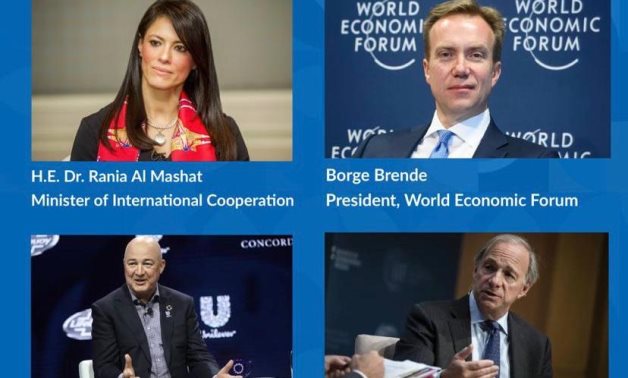
H.E. Dr. Rania Al-Mashat, the Minister of International Cooperation, participated in “The Jobs Reset Summit
H.E. Dr. Rania Al-Mashat, the Minister of International Cooperation, participated in “The Jobs Reset Summit: Building a New Economy and Society” a webinar series by the World Economic Forum (WEF), and spoke about Egypt’s initiatives for building capabilities for the future of work.
Moderated by President of WEF, Borge Brende, the CEO of Unilever Alan Jope and Founder of Bridgewater Associates Ray Dalio also participated in the webinar.
The minister began by stating that though the COVID-19 pandemic caused high unemployment rates worldwide, this disruption causes an opportunity to reskill employees in a way that promotes a sustainable and inclusive economy. “The true challenge from the pandemic is that more than 195 million jobs were lost globally, and from the estimate that the WEF puts out, 54% of those employed need to be reskilled. I find that Egypt’s young population, which constitutes 60% of the total population, is a major opportunity,” Al-Mashat said.
She elaborated on how Egypt’s education system has evolved into becoming more tech-based and how the future of jobs require tech savvy people.
She mentioned projects that are currently ongoing, such as the Youth Enablement for Freelancing’ Initiative, which aims to train 20,000 young people, nationwide, on freelancing skills, through e-platforms.
This is achieved in collaboration with the Ministry of Youth and Sports, through the integrated community centers that the Ministry of Communication Informational Technology (MCIT) has technologically developed, with Persons with Disabilities making 10% of the trainees.
In Egypt, there has been extensive effort and work done by the government to reshape the education system so that it could allow for more technological tools. Since these developments were already in action before the pandemic hit, considering Egypt’s population size, homeschooling and resorting to online education and work was significantly important to mitigate the impact of the COVID-19 crisis.
Al-Mashat explained that MCIT has many initiatives related to reskilling youth and providing them with technological advancements. “This is what we call the digital entrepreneurial space,” said Al-Mashat.
The minister also gave the example of Egypt’s new cities, such as the New Administrative Capital which provides a landscape for foreign companies and the private sector to employ youth. “We are trying to show where that potential is so the firms that come in and create the job opportunities manage to find the labor force with the necessary skills,” she said.
This change in work environments also includes women. Al-Mashat has previously reiterated that the inclusion of women is necessary for economic growth and development. Egypt was the first country in the region to launch the “Closing the Gender Gap Accelerator” which aims to close the economic gender gaps.
For his part, President of WEF, Borge Brende said that economies need to make sure that economic growth is inclusive, sustainable and creates necessary jobs.
Alan Jope, Chief Executive Officer of Unilever, said economies need to invest more in skills and training, adding that, “We need to start bringing social and environmental issues to the fore," he says. Second, we cannot spend resources propping up the jobs of the past - we need to invest in skills and training.”

Comments
Leave a Comment